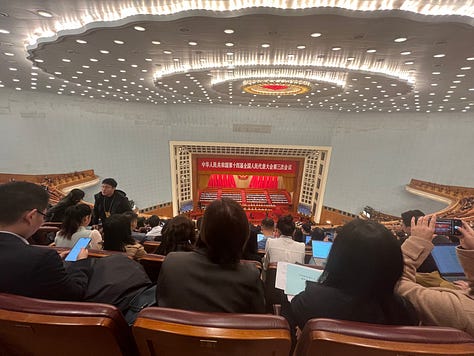碎篇 // Suipian // Fragments
Welcome to the 5th edition of Suipian, my personal newsletter in which I share thoughts and resources that help me make sense of Chinese society and its relationship to the rest of the world. You’re receiving this because you were previously subscribed to Changpian, my earlier newsletter sharing Chinese nonfiction writing – or if you recently subscribed. See here for more introduction to Suipian.
I hope you’ve been well. Today’s edition is a bit shorter than usual (maybe a good thing). Welcome also to those of you who subscribed because of the kind shout-out by David Ownby, who translated the 端传媒 story on Covid grief and anger that I shared last time. If you did not have a chance to read it, I recommend his excellent translation (and the rest of the Reading the China Dream website).
随笔 // Suibi // Notes
Sharing thoughts or resources related to my work as a correspondent
When the new Trump administration got started on their ‘breaking things’ agenda, Western mainstream media quickly framed this as a great opportunity for China, especially on issues like the dismantling of USAID. I was struck by how that conversation seemed all but absent in China, where there was shock and some gloating at the chaos, but as far as I could tell not much talk, at least among the public, of how these developments might benefit China’s rise. I explored this topic in a few stories (and a Dutch podcast) for which I talked to experts but also to people like Mr. Ye, a retired Beijinger who I met in a park and who took some time from listening to his audio book to kindly mansplain me on how things look from China.
His views – on America as an unreliable ‘paper tiger’, a shockingly weak Europe, sympathy for Ukraine, China as responsible but not interested in becoming 老大 (“有多累啊,你起码需要更大的军队,需要很多基地,你得出力,出力之后你自己国家管不了了,中国自己问题不少 -- 共产党不傻了,他不具备做老大的能力,老百姓也不会赞成”) – are not very surprising, as they fit with one common worldview in China. But perhaps that’s exactly why they are worth occasionally jotting down. Someone else, an urban professional in their 40s, told me that “we don’t have that international mindset. And maybe there will be no new number one for a while. Just look at history, for instance at the period of the five dynasties and ten kingdoms. Let’s try not to think about this in overly simplistic terms.”
As a general China correspondent doing a bit of everything, it can feel funny when someone asks me what my focus is. But, if anything, I think one of my goals should be to inject some of those Chinese street-level or societal views into our news. Most Western news stories on geopolitics don’t feature any Chinese non-state voices, but that does not mean China’s domestic affairs or public opinion are irrelevant to Chinese state thinking on these issues, or that these voices aren’t valuable in their own right. (Of course, a key obstacle is the difficulty of interviewing in China, but that gets a bit easier the less directly China is involved, which made Beijing street interviews on Trump more doable for tv colleagues too.)



点赞 // Dianzan // Likes
Recommendations in and out of the news-cycle
At WOMEN我们, a profile of 富察, the Chinese-Taiwanese book publisher who was recently convicted to three years of prison on secession charges after disappearing during a visit to the mainland in 2023. It vividly portrays a man who seems hard to pin down, and who introduced authors as diverse as Yan Xuetong, Peter Hessler and Louisa Lim to a Taiwanese readership. The piece also discusses the fear and uncertainty his disappearance caused: “从2019年到2023年之间发生了什么,中国的尺度发生什么变化,完全没有人知道. 风险到底是来自变化,还是没有变化的部分?
ICYMI: the new weekly newsletter from the 民间档案馆. I love the format of exploring a piece of their vast online resources each week. See also the recent 不明白 episode in which co-founder Ian Johnson talks about it (recorded in Holland!).
单向街’s literature awards are on their 10th edition this year, and in this piece founder Xu Zhiyuan and some literary 嘉宾 look back on the past decade. I learnt that the literary brand’s name is a reference to Walter Benjamin’s One-Way Street (also an enjoyable read).
In 正面链接, an interesting feature on the rise and fall of private kindergartens in China, in large part due to increasingly stringent regulation. “2019年,全国民办幼儿园总数达到顶峰,此前的17年,民办幼儿园从5.55万所(2003年),增加到17.32万所(2019年)。2020年,这个数字将第一次下降,并在接下来几年持续加速下降。2020至2023年,民办幼儿园减少的数量分别是5280所、1254所、6213所、11013所.”
Communication scholar Fan Yang walks through Shenzhen’s Huaqiangbei and sees how the 山寨 history of the area is being erased.
As always, the “记者的家”新闻奖 award list is really worth a look for getting a sense of what investigative journalism is still happening in domestic Chinese media. With this year’s big prize for the 新京报 report on the contaminated tankers transporting cooking oil, and other awards for work that I had missed, such as a 指定居住 case and a Caixin feature on people jailed due to owning fake guns. (Thanks to Fang Kecheng’s Newslab for posting.)
Good piece in 澎湃 on the (possibly immense) difficulties of switching phone numbers in today’s 实名 China. Be warned!
My colleague, tech reporter Marc Hijink, is currently in China promoting the Chinese translation of his book on ASML, the Dutch semi-conductor company that has found itself in a global spotlight amidst the US-China tech war. I found it a really informed and nuanced account. See here for the book’s details (CN version, EN version), and here for an in-depth Chinese interview with the author, in which he, as is usual in his reporting, searches for metaphors to explain the complex technology: “其实你可以把芯片工厂想象成面包店。在面包店里,烤箱是一个核心工具;而在芯片工厂,光刻机是核心工具。它就像一台巨大的复印机,以某种方式复制芯片设计,并将其印在硅晶圆上,这是通过光的技术来完成的.”
A sad first-person account by 35-year-old and cancer patient 阿娇 on a difficult and accomplished life in 三联. It got a lot of views, perhaps also because of all the societal insights between the lines.
This recent paper by political scientists Shaun Breslin and Mikael Mattlin is a dense read, but I found it a smart analysis of “why dominant perceptions of China have shifted over the past decade in Europe” that also tries to explain how that happened (think tanks played a big role) and lines out some of the practical challenges of maintaining effective cooperation within a dominant frame of its potential threats. Interesting read in this moment of shifting narratives.
A student interview with Dutch sinologist Rens Krijgsman on 出土文献, the textual materials on bamboo and silk that have been unearthed in large amounts in the last decades (part 1, part 2). See also the open-access journal he co-edits on what the discovered texts tell us, for instance about women in the Qin-Han transition.
“What did Chinese millennials grow up watching?” and 山西面食
That’s it for now. Thanks for reading :)



